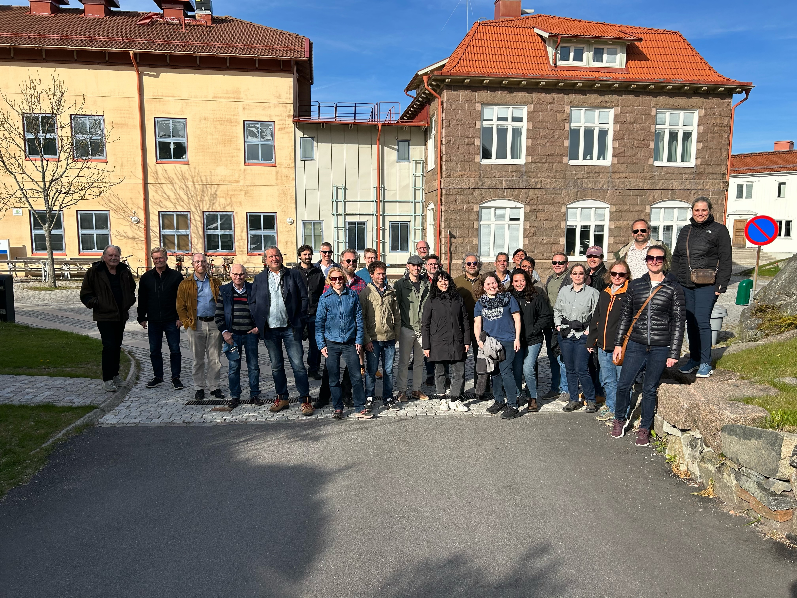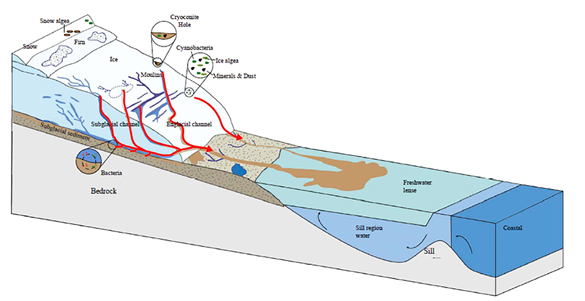
Photo: Participants of the fjord workshop at the Kristineberg Center for Marine Research and Innovation, Fiskebäckskil, Sweden (credit Per Hall).
Through land-use change and climatic stressors humans significantly impact biogeochemical processes and larger carbon stores in fjords. Sediment delivery from accelerating erosion (e.g., mining, deforestation, road building, agriculture, and retreating glaciers) or from sequestration of fluvial sediment behind dams has been seriously altered in the Anthropocene. Thus, fjord biogeochemical processes provide significant insights into how Earth’s systems may respond to changing climate. For example, fjord geologic records provide insight into the global mechanisms influencing regional climate change and provide critical context to changes we observe today, such as polar amplification in high-latitude fjords, providing the long-term background and natural variability. Despite constituting <1% of the total ocean surface area, fjords account for as much as 11% of the total organic carbon (OC) burial in the ocean (estimated 17 to 21 x 1012 g OC yr-1). Additionally, fjords may represent an important interface for marine weathering processes.

Figure 1. Glacial nutrient and carbon factories. Sources (magnifying glass) and transport pathways (red) of carbon and nutrient inputs from land-terminating glaciers to fjords (modified from Chu, 2014 and Boetius et al., 2015).
On May 8-12, 2023, a workshop on fjords organized by Per Hall, Lars Arneborg, and Göran Broström of the University of Gothenburg and the Swedish Meteorological and Hydrological Institute (SMHI), was held at the Kristineberg Center for Marine Research and Innovation in Fiskebäckskil, Sweden. A diverse group of scientists from Belgium, Chile, Denmark, Norway, Scotland, Sweden, and the USA gathered to focus on fjord biogeochemistry, oceanography and modeling. Participants explored our current knowledge of fjords (empirical and modelling) as important aquatic critical zones and harbingers of global/climate change. The workshop featured a series of talks on the biogeochemical (water column and sediments), trophic, and physical dynamics of fjords across the globe and on recent advances in modeling these complex systems. Some of the key knowledge gaps identified at the workshop are: 1) the influence of melting glaciers on the ecological interactions of light and nutrients across steep salinity gradients; 2) how the changing role of marine versus terrestrial inputs of OC (e.g., permafrost, petrogenic, land plant detritus – via shrubification) in warming climate will affect burial and carbon sequestration of OC in fjord sediments; 3) how enhanced inputs of metals (e.g., Fe), via weathering and release of minerals in the cryosphere (via thawing), will impact the role of mineral-OC preservation in sediments; 4) a need for higher resolution data sets and model development to improve model representation of fjord responses to changing hydrology, atmospheric, and coastal ocean forcing, and other anthropogenic pressures such as aquaculture; 5) how to create projects where the requirements for joint observations and models are considered early in the planning phase; 6) how they can serve as hubs for invasive marine species; and 7) a need for a coordinated global network—using times-series measurements and observatories at strategic locations to achieve a global consensus identifying key fjord regions that serve as “hot spots” of carbon sequestration—for better guidance on the sustainable management and protection of these coastal systems.
If you are actively conducting research in fjords, there is a call for papers in a special issue on fjords to be published in Global Biogeochemical Cycles and Journal of Geophysical Research – Biogeosciences, entitled Fjords: Estuaries on the Front-line of Climate Change (co-editors Thomas S. Bianchi, University of Florida, Alexander Michaud, Bigelow Laboratory for Ocean Sciences, Candida Savage, University of Otago, Craig Smeaton, University of St. Andrews and Laura Wehrmann, Stony Brook University), submission deadline is August 31, 2024.
We also have a special session on fjords at the Ocean Sciences Meeting to be held in New Orleans 18-23 February 2024:
CB003 – Fjords as Aquatic Critical Zones on the Front Lines of Global Change
Session organizers: Emily Watts1, Thomas S Bianchi1, Alexander B Michaud2, Gesine Mollenhauer3 and Laura Wehrmann4
(1) University of Florida, Department of Geological Sciences, Gainesville, United States; (2) Montana State University, Bozeman, United States; (3) Alfred Wegener Institute Helmholtz-Center for Polar and Marine Research Bremerhaven, Bremerhaven, Germany; and (4) Stony Brook University, Stony Brook, NY, United States





